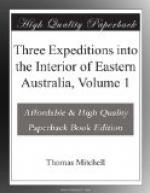UNCERTAINTY OF MR. CUNNINGHAM’S FATE.
The other my men recognised to be Werrajouit, the native who formerly had in his possession the handkerchief which was supposed to have belonged to Mr. Cunningham. I thought that if that gentleman had really been sacrificed, some of these fellows had been guilty of his murder; but we were still uncertain of his fate; and perhaps his life had been saved by some of these very natives whom the men were now much inclined to seize as his destroyers. A gin and child were brought to us that we might give some clothes to the latter, a practice we had foolishly encouraged at the first interviews; so that they almost persecuted me with young children, expecting that they should receive something. This gin had an English haversack, and Burnett, by my orders, examined the contents; but he found nothing likely to have belonged to Mr. Cunningham except a piece of cloth. This search was made after they had disappointed us respecting a waterhole and when the man who had promised to be our guide had decamped.
All the ponds in which we had found water before were dry, nor could we obtain it elsewhere, although Burnett had examined the Bogan to Burdenda. I knew by the result of our former search for Mr. Cunningham that no water was to be procured down the bed of the river for many miles; and I therefore cut off four miles of this day’s route and continued our journey as far as possible, having provided against a night without water by carrying as much in barrels as supplied the whole party, and afforded half a gallon to each of the horses and bullocks. We encamped on a grassy plain, about five miles on in our journey of the 1st of May.
MR. LARMER OVERTAKES THE PARTY.
September 3.
I sent Burnett and two men forward to examine some ponds beyond our former camp of the 30th of April, while the rest of the party followed. Mr. Larmer overtook us during this day’s journey, having last night been encamped with his party only three miles behind us.
RESULT OF HIS SURVEY.
He had found in Duck creek long reaches, like canals, full of excellent water, and covered with wildfowl of every description. On its banks grew large gumtrees like those on the Darling; and he had traced this channel to a large lagoon near the Macquarie, the bed of which was found to be quite dry. Many small watercourses led from the Macquarie into Duck creek, which indeed appeared to be the lowest channel of this river, the general fall of the country being to the westward. The identity of the two channels was further established by the quartzose sand found in both. It appears that a low range of firm ground separates the Bogan from Duck creek, the bed of which and all the land between it and the Macquarie consists of an alluvial soil altogether different, according to Mr. Larmer, from any we had seen on the Darling. This surface was covered with a luxuriant green crop of grass, a sight which we had not enjoyed on this journey, and there were also numerous kangaroos and emus, for whose absence from the plains of the Bogan we could not previously account.




